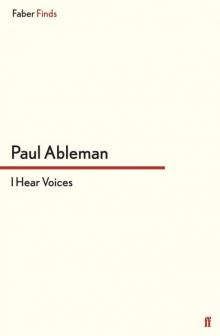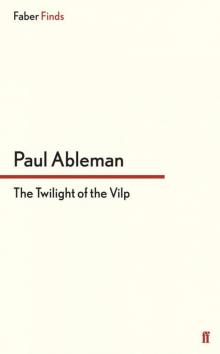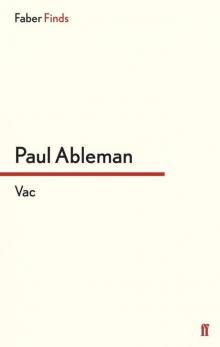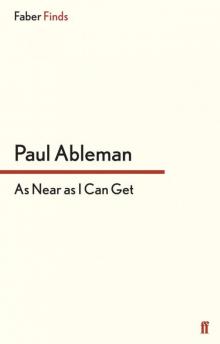- Home
- Paul Ableman
As Near as I Can Get
As Near as I Can Get Read online
As Near as I Can Get
PAUL ABLEMAN
Contents
Title Page
Preface to the 2014 Edition
My Uncle Edward called …
The office was visually a place of sterile tedium…
Mary and I had always quarrelled…
Summer
Who else?
It was Charley Nelmes…
Below the family cottage…
Is this characteristic of our times?
For about a year I knew Ned Collins well
It was snowing
When I first came down to London…
As for the Cambridge…
I recall the slender shoot of annoyance…
And now, in perverse conclusion…
Copyright
Preface to the 2014 Edition
Paul Ableman – playwright, experimental novelist and screenwriter – was one of the most recognisable and well-loved literary figures of Hampstead.
When I first knew him, he was living in a penthouse flat in Fellows Road, which went through many metamorphoses during his long residence. It started off as a small bachelor pad in the wild late sixties, but expanded mysteriously over the years to accommodate more and more books, computers, his second wife Sheila, his younger son Tom, talkative dinner parties, and large summer parties of guests who would crowd on to newly sprouting balconies amongst the pot plants, sit on top of one another on settees, and yell at one another happily in crowded corridors. It was like the Tardis. There was much more room in there than you would have thought possible.
Ableman, too, though small of stature, contained multitudes. He was born in Leeds in 1927 into an unorthodox Jewish family. His father, Jack, was a tailor. His mother, Gertrude, wanted to be an actress, left his father and moved to London, to Hampstead, where she fell in love with an American journalist, Thurston Macauley. (I liked his mother, a flamboyant woman who used to make lively contributions to my class at Morley College, but Paul was more critical of her, and I guess he knew her a lot better than I did.)
Paul was brought up in New York with his mother and stepfather and sent to Stuyvesant High School, returning to England aged eighteen. He did his National Service in the Education Corps, in Gibraltar and Scapa Flow, then went to King’s College London to read English, but did not finish his degree, hanging out in Paris instead, writing erotic fiction.
His novels include I Hear Voices (1957), published by the Olympia Press (a work of which Maurice Girodias was very proud), As Near as I Can Get (1962), Vac (1968), The Twilight of the Vilp (1969, his first book to be produced by Gollancz), and Tornado Pratt (1978): these works were praised for their inventive language, bawdy high spirits, and originality of form by Anthony Burgess, Philip Toynbee, Robert Nye and other friends of the avant-garde.
But his first publication had been a play, written with his mother, Even His Enemy (1948) – produced in London as Letters to a Lady in 1951. Green Julia, his first full-length play, in which two young men discuss an absent mistress, was a great success at the 1965 Edinburgh Festival, and other surreal and experimental plays (such as Tests, 1966) followed, with the encouragement of establishment critics like Harold Hobson, but Ableman also wrote screenplays of a more popular nature. He described himself, proudly, as a freelance writer, and could turn his hand to many different genres, including general science books.
He made something of a speciality of ‘novelising’ BBC series, such as Shoestring (Shoestring, 1979, and Shoestring’s Finest Hour, 1980), Porridge (Porridge: The Inside Story, 1979, and others under the pseudonym Paul Victor), Hi-de-hi (Hi-de-hi, 1983), Dad’s Army (Dad’s Army: The Defence of a Front Line English Village, 1989), Minder (Straight Up: The Autobiography of Arthur Daley, 1991) and Last of the Summer Wine (Last of the Summer Wine: A Country Companion by Clegg, Foggy and Compo, 1992).
His embrace of the sexual revolution of the 1960s unwittingly exposed him to risks. In 1969 he published a book called The Mouth, a harmlessly entertaining and informative book about orality drawing on mythology, psychoanalysis, literature and art, and pleasantly illustrated with images from Magritte, Kitagawa Utamaro and other respectable sources. This provoked an obscenity case of some hilarity, which was very ably contested by Jeremy Hutchinson, and the book and its author were triumphantly acquitted. I appeared as witness for the defence and I hope made a good case for Ableman’s good heart, innocent intentions and literary merit.
Ableman’s first marriage to Tina Carrs-Brown ended in amicable divorce: they had one son, Martin. He married Sheila Hutton-Fox in 1978, with whom he had Tom. His emotional life went through periods of turbulence, but he was always an attentive and affectionate father. As he grew older, he grew milder and more benign (although his amazing shock of hair grew larger and wilder), and he remained an eccentric rather than a conformist.
He was a great walker, and liked to set off into the wilds with his compass, alone or with his wife and son, sometimes sleeping in the amazing expanding Dandy he attached to his car. He made a good gin and tonic in his Dandy, high on Exmoor. He loved the natural world as intensely as he loved the pubs of Soho. On my last walk with him, in the Chilterns, we sat in a field eating our sandwiches, watching a red kite, while he explained to me his theory of the mind, which he expounded in his last book. He was a wonderful talker, but never a deliverer of monologues: he was always eager for a response, and listened to the stories of others with keen curiosity.
The Secret of Consciousness (1999) concerns the function of dreams and the archival capacity and processing mechanisms of the brain during sleep. His claims have yet to be tested, although he maintained it would be easy to do so in a sleep laboratory. His scientist friends (who included Lewis Wolpert) were not persuaded by them. He believed that during sleep the brain sorts and stores diurnal sensory impressions, on a Twin-Data system, one pathway leading to consciousness, the other to the archival memory, and that identity is no more (or less) than the unique set, or narrative, of sensory data of each individual. He saw the novelist’s use of ‘interior monologue’ as an attempt to describe this fluid and ever-changing process of creation.
In later years he began to keep an impressively detailed journal – a sort of forerunner, as he saw it, of the blog – in which he noted domestic and social events and his thoughts on such disparate matters as Judaism, technology, the restaurants of Swiss Cottage and the acting techniques of Peter Sellers: a record of an enquiring mind which found all human life of interest.
Ableman bore his last years of illness with an exemplary mixture of stoicism, good manners and good humour that made his company a pleasure. He never complained, and retained his affectionate delight in others to the last.
Margaret Drabble
(Margaret Drabble’s obituary for Paul Ableman was first printed in the Independent on 31 October 2006.)
MY UNCLE EDWARD CALLED, a great surprise, thundering into my educative world, kicking the book from my hand and prowling self-consciously about. A small, solemn, self-righteous Northerner, Uncle Edward looked at me soberly as he explained how mother worried.
‘We respect your motives,’ he growled. ‘We admire your resolve and we don’t wish to burden you with family matters. Lad,’ he spoke earnestly, tapping my knee, ‘your mother’s worried. We won’t talk about the past. She’s made a place for herself in the village. What is she to say when Mrs Hewitt inquires after you?’
I made no reply.
‘She’s a village woman. She’s been a village woman all her life and she’ll die a village woman. I’ve been in the war and if you think we’re narrow I can understand. I’ve killed men and I’m glad to say that the mills are working overtime again. There’s competition from the East. Well, we’ve faced
that before. Unlike some of the directors I understand that men must live. East or West. The mills are humming, lad.’
They were dropping a new building outside.
‘That’s a fine building going up, lad. Not a barracks, I suppose?’
Behind my fixed scowl, I pondered whether my uncle’s remark was intended as a mild taunt, a suggestion that a barracks was where, for a further salutary year of discipline, I belonged. First, assimilating manliness and health and then perhaps blazing off somewhere to gun huts, blast trains, drench columns in jellied petrol (inextinguishable, tenacious flame), to wield, gingerly, by predetermined arming stages, even a little capsule of the sun, glazing a continent from the sky. The drums, lad, are an education.
‘Do you hate public ownership?’ I asked him, trying to lure my blunt excellent uncle into my home realm of ideas, where I could dodge nimbly around, from concealed position to position, alerting the gun crews, while my poor, blundering uncle was still ramming home the wadding in his matchlock. Fool, I thought, one of so-many-million lethal fools!
Tall, gaunt, atrociously-clad, I stalked with Uncle Edward to the corner tea-shop. Anonymous London roared primly to work. Already at work, a street-gang, outside the grey mouth of the underground station, had released an evil seep from the sewers through which we plodded gasping.
In the tea-shop we queued for buns and my uncle’s shrewd eyes inspected the food. Daily familiarity had not acquainted him with the landscape-like permanence of the items displayed and he seemed to find the array rich and appetizing.
‘Have a bun, lad,’ he urged, placing the limp morsel on my tray. ‘Perhaps you’d prefer something hot? Grilled bacon? It looks very tasty.’
He called me ‘lad’ several more times before we reached the ranked cups of insipid coffee and once I smiled secretly to observe the faint, surprised twitch of a lady in a blue dress as she referred the diminutive to my towering form, greasy clothes and introspective air.
‘What’s it like in the village, Uncle?’ I asked, when we were seated, and after I had, for a little while, contemplated the provincial having a good look round at such citizens as eat breakfast in chain cafés.
‘It could be better,’ he announced sternly. ‘There’s no way of keeping it from you indefinitely. Your sister Edna has become a laboratory assistant in the south.’
I thought of Edna, a little, chubby girl, rolling repeatedly down a green bank creasing a velvety sweep of lawn, until mother forcibly stopped her. Edna went and sat silently, after that, against the bole of a spreading cedar and absently fingered her genitals, until mother suddenly gasped and rushed over and hit her. At night, while Edna, Mary and I queued up for our baths, peering around huge, fresh towels to see what the others were doing, bombers droned overhead to smash factories, and father.
‘Well?’
‘No, its not that. I hardly know how to tell you. She’s stopped writing.’
There was little to tell, it seemed. Someone had seen Edna dancing at what seemed to them a disreputable place, an ordinary place really, a cellar at the sea-side full of gyrating young men and women in thrall to the latest variety of American commercialized folk music, enforcing, with their supple bodies, the precious illusion of primitive abandon and straining, almost in direct proportion to their capacity for mental activity, to still thought.
My uncle told me about the electricity. It had reached Widow Baker’s cottage beyond the first milestone at last. Widow Baker was in the grid at last. Edna was in the laboratory.
Uncle Edward dissolved and was replaced the next morning by Simpson, a sallow, meagre comrade in a cloth cap, a long, patched filthy overcoat and a collarless, soiled shirt. No previous acquaintance of mine, Simpson bestowed his name on me only indirectly, although I was doubtless a more suitable recipient of the information than the one he chose, his coffee cup. Thus, after poring over this in obviously unstable silence for some time, he suddenly muttered fiercely, without raising his eyes from the unresponsive cup, ‘Simpson, that’s me—Simpson—I told ’im——’
Once initiated, the indignant recital of his wrongs soon swelled to a torrent. Rarely, I thought, would sufficient awareness of the distinction between generation and expression of thought to permit even such a tentative silence, menaced by working lips and shifting glance, as had existed a moment before, be available to him. Now he chattered mechanically on, his challenging look indiscriminately directed now across the table we shared at me, now at some of the other already edgily deliberate or covertly glancing breakfasters, now at the wall or staircase, although repeatedly his eyes roved back to mine as if to caution me that, huddled frozen and anguished behind the cascade of obscenity, a still-vulnerable mortal was aware of my reactions.
A girl smiled at me in wry sympathy, and I quietly went on eating. I think it was that same day that another girl smiled at me, quite rational, sane, as it is now perhaps legitimate to describe girls who throw themselves out of windows, munch heavy overdoses of sedative drugs and assault themselves in other ways. Not sane, perhaps, neurotic, ill in the nerves, but certainly rational (though this too is a difficult point).
‘Had a good day?’
‘Some sort of day.’
‘Aren’t you clever?’
This poor girl was emaciated. She had contracted just below the dimensions of her evident former attractiveness. Perhaps it was not only from existing indications but from vague recollection that I endowed her with lost good looks. In spite of the ease with which we had glanced at each other and started to talk, we had certainly never spoken to each other before. And yet I felt that somewhere in a group, at a party, in a pub, I had seen the dark-haired female whom I now regarded as the enhanced prototype of my present companions.
We had spells of silence. Three times the waiter brought us new glasses and three times we drained them. After struggling, in response to my polite questioning, to tell me something of her life, and failing, she admired another thing I’d said, about the world, the whole world with its slippery seals and scientists, neurotic Western girls like herself, tittering, newly-emancipated girls, bound for the factories, in brown and yellow lands, and black lands.
‘Do you think so? You haven’t got a car I suppose? What is the name of—of——What is——’
In the world of publicity men are made happy by bottled beer and several of these implausibly gratified mortals were smirking at us from behind the bar. As they poured out their favourite brand, each immune, apparently, from any disloyal, but human, suspicion that his neighbour, on the next varnished and chromatic panel, might not actually have secured a superior brew, their tennis partners, or riding companions, or moonlit-balcony, fragrant-night-air-inhaling consorts, drew near for their own cherished draught. Dangerous business, I thought, if carried too far. Perhaps dangerous in any degree. For instance, America, where officialdom of all kinds, political, commercial, educational and the entertainment industry continually forge new, chrome-plated nation-myths to bolt over a furious and heterogeneous people: backwoodsmen at heart who love fishin’; kindly, easy-goin’ folk; eighteenth-century revolutionary intellectuals; Athenian democrats; handymen who really hate production lines; small townsmen who just haven’t noticed that some ‘cussed, doggone busybodies’ have gone and extended the town limits right up to Canada and down to Mexico. And the sombre, stripped, urban American inspects the myths with expressionless eyes, thinking ‘I’m not like that and that’s what Americans are like. What’s the difference? It’s a crazy world.’
Rosy, the night walker, leaned against her usual corner where the soft strip-lighting, in nursery pink, creamed away the harshness of her complexion. She stood with her hands crossed behind her, flat against the pitted brickwork, while her legs, running obliquely to her stiletto-heeled shoes, pressed her plump bottom against the wall. Soon, if she were lucky, one of the solitary men passing through the district would pause in response to her murmured endearment, stand gazing past her as if only half aware of her presence while she e
laborated her offer, and ultimately perhaps stalk rapidly behind her as she turned a corner, crossed a street, marched purposefully up an unexpectedly gloomy defile and disappeared into a dim doorway set in a sooty façade.
And a few moments later we had been alone in a sickly, first-floor room. Or were we alone, I had wondered warily, noticing a door just wide-enough open to show that the chamber next door was unlit.
‘Are we alone?’
‘Now come on, you haven’t hired a life companion. Here——’
Brusquely she manipulated my ardourless person, insulating it from any but the dim illusion of carnal contact. She was naked from the waist down, I noticed, having removed her skirt. When? While I’d been glancing dubiously at the parted door. Her dumpy, stockinged legs, medalled with suspenders, and tufted abdomen, seemed strangely detached from the brisk, commercial lady above them.
‘Well, come on!’
Now she was on the bed, lower half a pair of legs splayed submissively, upper half an impatient and uncongenial person whom I scarcely knew.
‘Are you going to get started?’
‘No——’
‘No?’ (rearing up).
‘Yes—why can’t you be more——’
More like memory, selective memory, more like anticipation. More like the doting imagination, endlessly elaborating voluptuous phantasy. Less like life. For Rosy on the street corner, with tightly drawn bodice and short skirt, the patient girls in doorways as we stride past, the elegant, youthful professionals strolling in expensive neighbourhoods, the girl-cluttered parks under the streaming lights, resolve themselves long, too long, before the critical moment into just you and a stranger. And the mighty gland is sensitive to personality, although it soon forgets.
‘Aren’t you finished yet?’
Just about. There! The minor physiological flurry subsides and, while the untouched mind gloomily directs the hands to fasten buttons and adjust clothing, Rosy bounces swiftly up, buttons round her skirt, re-reddens her lips and waits impatiently to return to her corner. And you pat volume two of Anna Karenina in your jacket pocket and follow her out into Rocket Street.

 I Hear Voices
I Hear Voices The Twilight of the Vilp
The Twilight of the Vilp Vac
Vac As Near as I Can Get
As Near as I Can Get Tornado Pratt
Tornado Pratt